R.J. Keller's Blog, page 8
April 8, 2011
Greeting Their Cries of Hate (Guest Post by Todd Keisling)
– a guest Post by Todd Keisling
[You can enter to win an ebook copy of A Life Transparent by leaving a comment below. A winner will be drawn at random by Todd and announced on Monday. - RJK]
I may be stepping out on a limb here, but I think it's safe to say that anyone who's a writer or works in some facet of publishing has heard about Jacqueline Howett's little meltdown a couple of weeks ago. I won't go into detail here because, frankly, that's been done to death, and I'm of the opinion that we should give the poor woman a break. In a nutshell, she got a bad review and attacked the reviewer. This led to a whole mess of problems, including 75 one-star Amazon reviews. Like I said, let's give the poor woman a break.

Who is Donovan Candle? (click for a link to purchase at Amazon)
I only bring it up here for the sake of context. See, that same week, I was also graced with a blistering review of my novel, A LIFE TRANSPARENT. It isn't the first, and I'm sure it won't be the last, but boy, did it sting. I went through a self-imposed mourning period that lasted about 48 hours before I woke up, put on my big boy pants, and got over it.
That period of 48 hours was spent quietly rocking back and forth, reassuring myself that the book isn't that bad in an incomprehensible babble. Friends called to console me. My wife cooked a meal of comfort food. My editor, in typical editor fashion, simply told me to get over it and stop reading reviews.
"But how can I not? They're reviews! Of my book! And this one was bad! It's like if a teacher tells you your kid's an idiot."
(Full disclosure: This is all for dramatic effect. The conversation was way more subdued and less weepy. My editor may tell a different tale, however. Fortunately, this isn't her article.)
And then she said something that knocked me out of my stupor self-loathing and doubt: "There's no such thing as bad publicity."
She was right. It was a sobering thing, realizing that one bad review (or even three) wasn't going to kill my career, but could only serve to pique curiosity. In some way it was a sort of Sisyphean moment, like I'd pissed off the gods by finding comfort in the rock, and in that fact I could find some form of solace.
I realized that, bad review or not, people were still reading the book. They were allowed to form their opinions based on their experience. To date, ALT has had far more positives than negatives, with an average of 4 stars on Amazon and Goodreads. Do those low ratings stick in my craw? Absolutely. But I'm not going to stop doing what I love because of it. In fact, I see those poor reviews and bad ratings as incentive.
Every time I sit down at my computer, or take a pen and notebook in hand, I think of those folks who hated my work enough to speak out about it. I think of the honest reviewers who really just didn't like my work. I think about their words, and then I put pen to paper or fingers to keys and I do what I was put here to do: I write. I write because I want to prove them wrong. I write because I want to win them over with that next work of genius. I write out of spite. With ALT, I wrote the best book I could, and with my editor's help, we made it even better. Some people love it, some only like it, and some absolutely hate it. I'm okay with that.
The Jacqueline Howett scenario made me realize that that easily could have been me. It could have been you, or anyone else, for that matter. It's our natural instinct to defend ourselves when we're under attack. That's not to say that what she did was right—far from it—but the negative reactions and attention she's received because of it is far overblown. Best of all, regardless of all the reviews and negative press, her book was selling way better than mine. I hope it continues to do so, and I hope she continues to write. I hope her next book takes everyone by surprise and becomes a literary legend.
Now, two weeks on, I'm reminded of THE STRANGER by Albert Camus. On the eve of the protagonist's execution, faced with the absurdity of his predicament, he comes to terms with his place in life and the indifference of the universe:
"As if that blind rage had washed me clean, rid me of hope; for the first time, in that night alive with signs and stars, I opened myself to the gentle indifference of the world. Finding it so much like myself—so like a brother, really—I felt that I had been happy and that I was happy again. For everything to be consummated, for me to feel less alone, I had only to wish that there be a large crowd of spectators the day of my execution and that they greet me with cries of hate."
I hope Ms. Howett greets those cries of hate with a smile on her face, and continues to write. I will do the same.

Todd Keisling
Todd Keisling is a two-time recipient of the Oswald Research and Creativity Prize for fiction. His work has appeared in a number of print and online publications including Limestone, Kaleidoscope, and 365tomorrows. Born in Kentucky, he now lives with his wife and son somewhere near Reading, Pennsylvania. Contrary to popular opinion, he is a cat person. A LIFE TRANSPARENT is his first novel.
For more information:
————————————–








April 6, 2011
May in New York. Or the other way around.
May is going to be a busy, exciting month. As you probably remember (because I keep reminding you) Waiting For Spring's AmazonEncore re-release is set for May 10 (available for pre-order now, just sayin'). Now I can tell you that I'll be in New York City May 23-25 for BookExpo America, the largest book trade fair in North America, courtesy of AmazonEncore. w00t!
The fun will start Monday morning, May 23, when my husband, Dan, and I board a plane in Portland, Maine. I believe I may have mentioned before that I fear flying above all other things, including Donald Trump's hair and dentists' bills, but that's why they invented Valium. Assuming all goes well with the flight, I'll be checking into my room at what appears to be a wicked swanky hotel, INK 48, where I'll spend most of the afternoon getting ready for the party Amazon is putting on at The Press Lounge (which boasts "classic cocktails, an extensive wine list, and seasonally inspired small plates". I don't know what that last thing is, but I'm all for classic cocktails and extensive wine lists.). This kind of party is why they invented little black dresses and Mary Kay Suede lipstick, and I'm all set on both counts.
Then Tuesday: BEA! I can't adequately express how much I'm looking forward to this. I even bought a Waiting For Spring-ish necklace for the occasion. Just to be surrounded by books and the people who love and make them will be a huge treat, but I'll also get to meet in person several friends I've only known online; among them Craig Lancaster, Elisa Lorello, and fellow Paper Rat Kristen Tsetsi. That's right! The Rats will meet at last! If you're thinking you can expect an episode of Inside The Writers' Studio to come out of this, then you'd be expecting correctly. There's another event that's still in the works for Tuesday evening, and when I get more details about that I'll share them here.
Then Dan and I will spend all of Wednesday playing tourist. I've been warned not to wear my Red Sox jersey, advice I will surely heed, but I'd also like some advice on where to go and what to do. Something beyond the usual Times Square/Statue of Liberty thing (not that those aren't great places to see, I'm sure.) For those of you who are familiar with New York, what are your Must See Spots?
And, just because, here's my favorite episode of Inside The Writers' Studio.









March 25, 2011
Random thoughts about going gray
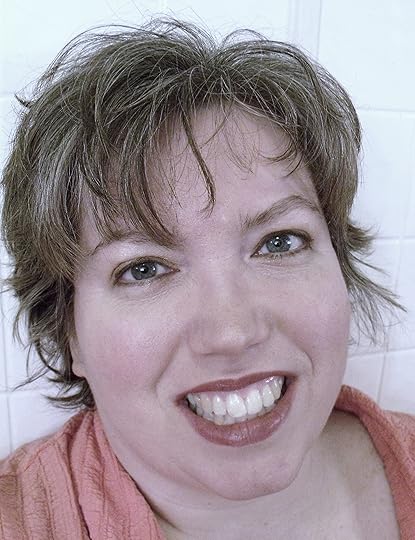 I cut my hair again last week to help speed along the process of transitioning from brown to gray. Now that I've finally made the decision, I want that process to be over with as quickly as possible. Right now, as you may be able to see from this picture (not sure how well it will show up on your particular monitor) it's salt-and-pepper throughout the top. I'm really digging the white streaks at my temples, too, and can't wait until it grows out a little so I can pull my hair back to show them off.
I cut my hair again last week to help speed along the process of transitioning from brown to gray. Now that I've finally made the decision, I want that process to be over with as quickly as possible. Right now, as you may be able to see from this picture (not sure how well it will show up on your particular monitor) it's salt-and-pepper throughout the top. I'm really digging the white streaks at my temples, too, and can't wait until it grows out a little so I can pull my hair back to show them off.
Still, I'd be lying if I said it's been completely painless. It's been an adjustment lately, knowing I look my age. I know that sounds petty and egotistical, but it's true. Before the gray I could at least pretend that I looked five years younger…








March 11, 2011
Beyond the acknowledgments page
The date for Waiting For Spring's re-release is drawing closer (May 10…less than a month away!), and lately I've been thinking a lot about the actual writing of the book. In particular, I've been thinking about the people who were of help to me during that process, and believe me when I say there were a lot of them. Today I want to offer a public thank you to one of those people, my friend Alice McCreary, the first person to ever read Waiting For Spring.
It's an awkward thing, sending something you've written to a friend, especially when the question, "Say…what do you think about this?" goes along with it. Alice is a librarian, an avid reader, and an extraordinarily frank lady, so although I was more than a little nervous about handing my baby over to her, I knew that her feedback would be absolutely invaluable.
She read Waiting For Spring a chapter or two at a time starting in January 2007, before it even had a title, and gave me two great gifts: encouragement and HONESTY. Her initial reaction of "I really like this! Send me more!!!!" allowed me to think I was onto something, but as the weeks went by, if something wasn't working for her – whether it was a character (Brian originally had a very bitchy ex-girlfriend), a phrase ("I don't know this word…is this a Maine thing?"), or a plot point ("Tess's mom is a real bitch on wheels. Why did her dad stay with her for so long?") – she told me so.
Then there was the email that began, "Okay, I'm home from work. Where's the next chapter????" That was very cool.
So, Alice: Thank you, a thousand times over. Thank you for your willingness to give me so much of your time and energy, for your advice and encouragement, and for your honesty. Thank you, too, for being my friend.








March 9, 2011
A new look!
Your eyes don't deceive you. Things look different around here.
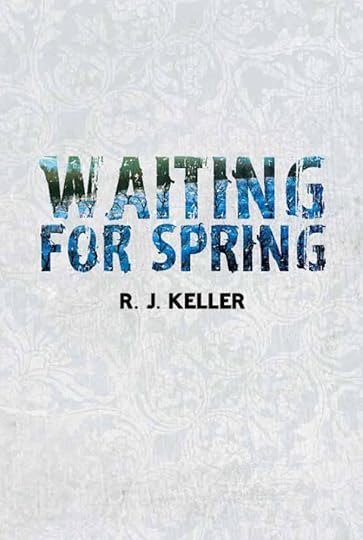
Have I mentioned before how much I love the new cover?
I decided to go with a new blue blog theme to match my new blue website theme, which matches Waiting For Spring's new cover.
Yes, I was just looking for an excuse to post a picture of the new cover. Also I'm all about matching.
Except for my socks. But that's a subject for another blog entry.








March 6, 2011
A final excerpt from The Wendy House
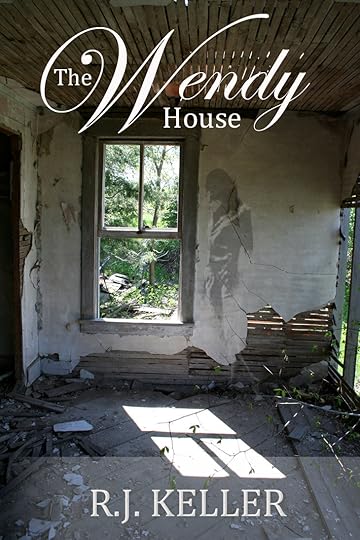
The hospital room smelled like decay, as though she was already rotting. It was dark, except for the dim, yellowy light coming from the lamp in the corner. The nurse had pulled the shade over the windows so the harsh summer sun wouldn't get in Wendy's eyes. Rick thought she might have liked to feel the warmth of it on her skin, but said nothing. It didn't matter, really. She was gone already.
Asleep. She's just asleep.
But he knew better. Her heart was beating, but she was gone, had slipped away hours ago. He sat there beside her bed anyway, could have sat there forever. It was the room, the world, where she was still alive. He wanted to hold her hand, to touch her face, but he couldn't. Brian was sitting across from him, on the other side of the bed. He was clutching a wad of white blanket, barely an inch from Wendy's arm. He wouldn't look at Rick. Wouldn't look at anything except the monitor, at the flashing red heart and blinking lights that told him his mother was still alive. Rick wished the boy would speak, wished he could think of something to say to his son, but what was there to say? Brian wasn't quite twelve, yet when he had told the nurses, several hours earlier, that he would not leave the room, he had spoken with such quiet authority that they had let him be. But the time would come—it wouldn't be long now—when the machines would fall silent. And this room would become just another in which she was gone.
The blip-blip-blip of the monitor skipped a beat. Brian jumped in his seat, then looked, finally, at his father. His eyes were dark, just like hers had been—
Still are. She's just asleep.
—and unblinking. The two of them stared silently at one another for a timeless moment, then back at the monitor as it skipped again.
This was it.
Rick forced himself to look at her face. It was sallow and shrunken, her lips thin and tight. He had kissed those lips when they were dusty from a dry summer road, had fallen in love with her that day, with something in her eyes that was dark and wild. A love so real it was like a creature come to life inside of him. And that face had glowed with moonlight in the backseat of his car. She had smiled down at him that night and he had lost himself in that smile, overwhelmed with the sudden, certain knowledge that his life had never been as good as it was at that moment, that it never would be again. She had loved him then. Her heart had been his.
Now it was all that was left of her, and it was slowing down…slowing down. She was leaving him. Again.
Your hair glowed that night, too, Wendy. It fell on my bare shoulders. You murmured something, I still don't know what. I pulled you closer because I could already feel you slipping away and I couldn't bear for you to go. Did I tell you that, Wendy? Did I ever say it?
He hadn't told her, had never said it. And now the steady whine of the monitor was telling him that it was too late. It was telling him that she was gone.








March 2, 2011
Fifth anniversary
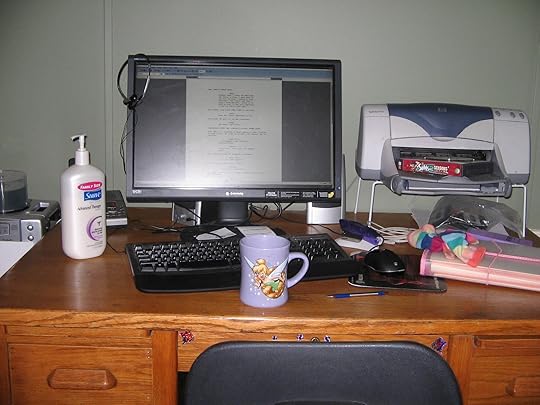
My messy writing desk.
Five years ago – yesterday – I began writing Waiting For Spring. I started it as an unofficial National Novel Writing Month project, as something to keep myself mentally occupied during a particularly rough patch of bad health, without any plans of ever letting anyone see the thing, let alone of having it published.
As I sat down at the keyboard at midnight on March 1, 2006, I had only a vague idea of what the book was going to be about, having made only minimal notes about characters and settings. Tess was a widow at that point, her move to New Mills (then called "The New Town Tess Moves To" in an attempt to boost word count) was an attempt to get away from Sad Memories. And so I started by writing Tess's moving day, knowing only that the chapter was going to end with her meeting Brian.
It took me less than a day of writing to realize that this wasn't going to work. Dead husbands don't bring a whole lot of conflict*. Ex-husbands, however, are chock full of it. So as I sat down to begin day two of writing – five years ago today – I knew I had to bring Jason back to life. I also knew that I couldn't start writing the book from the beginning. I had to be familiar with Jason and Tess's backstory before I could write anything to do with Tess's present. But I didn't know where to begin.
So I sat there, staring at the blinking cursor for a long time. A very long time. My mind was a total blank. I started to think that, maybe, I wasn't cut out for this whole writing thing. I started to think that, maybe, I should take up knitting instead. Except that I had told everyone I knew that I had started writing a book. I couldn't quit after one day. I'd never hear the end of it. I had to at least get the NaNoWriMo minimum of 50,000 words out, even if they were 50,000 of the shittiest words ever written.
And then it hit me. What I needed was an end point, a pivotal moment between Tess and Jason that I could write them towards. So I took a deep breath and, without really knowing what I was doing, typed out the following:
I had to look away from his eyes, because I couldn't let him see mine. Couldn't let him see the sudden, irrational spasm of jealousy that twisted my heart at the thought of him having our family–our beautiful blue eyed family–with someone else. Someone new.
It turned out to be my pivotal moment. It was the moment I knew what the book was going to be. I could suddenly see their life together, the long, long history between them. I saw what had brought them together and what had torn them apart. I knew what Brian had to be to make up for all of the things Jason hadn't been. I knew all of it, in just that one moment.
It was a very big moment.
So happy anniversary, Waiting For Spring!
* as opposed to long-dead wives, as is the case in the upcoming The Wendy House. They bring LOTS of conflict.








February 28, 2011
Like It For Time
I was a fan of Kristen Tsetsi years before I had the privilege of calling her my friend, having read her novel, Homefront back in 2007 (it will be re-released this spring as Pretty Much True…). It's a powerful and compelling book, inspired by the year she spent away from her husband (then-boyfriend) during his deployment to Iraq…although she calls it only semi-autobiographical.
Now Kristen is at the head of an online effort to get Time magazine to make the military family its Person Of The Year. "Social networking websites aren't just silly distractions," she says, "they actually make an impact. In April of 2009, actor Ashton Kutcher and CNN received wide media attention when Kutcher challenged CNN to be the first to get one million followers. (The actor beat the news.) Later, in 2010, a facebook campaign succeeded in landing Golden Girls actress Betty White a hosting gig on Saturday Night Live. If actors can use social networking sites to increase their personal fame, surely supporters of military families can be just as successful utilizing them for a far more meaningful pursuit: increasing awareness of a segment of our society that has long been underrepresented."
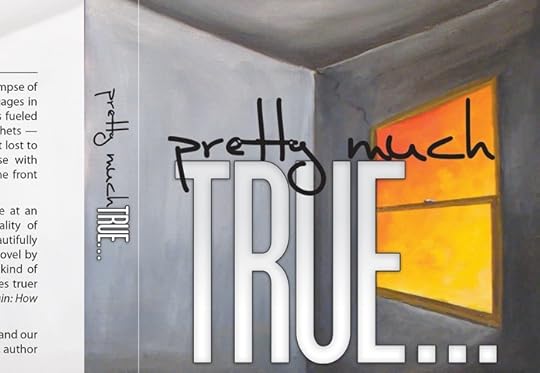
Kristen teases us with the top half of the cover for Pretty Much True...
RJ KELLER: Tell us about LIFT.
KRISTEN TSETSI: LIFT stands for "'Like' it for TIME," the "like" part referring to the "liking" of facebook pages ("like" the LIFT fb here!), the TIME part referring to the grassroots effort to get TIME Magazine to consider the military family as its 2011 Person of the Year.
"Why?" you ask.
Not because I think military families are special and deserve some kind of award. As TIME editors frequently explain, Person of the Year isn't an honor – if it were, Julian Assange wouldn't have been in the running for 2010. I think that, based on the criteria TIME uses to choose their Person of the Year, the military family more than meets it, and now – after a decade of giving up a family member for a year at a time every other year, or so (if not forever) – is probably the best time to do it.

Like It For Time
KEL: What are the criteria?
KRIS: "Person of the Year is given to the person, group, or thing that has most influenced the culture or the news during the past year," TIME says.
Culture (popular): Oprah's multiple shows honoring the military family; the efforts of Michelle Obama and Dr. Jill Biden to bring recognition and awareness to military families; 2011 marks the fifth season of Lifetime network's "Army Wives" (when has there ever been such a show?); and the E! Entertainment channel special, "E! Investigates: Military Wives."
Rudy Giuliani was chosen for Person of the Year following the September 11 attacks because he "embodied what was really most important, what we learned about ourselves, which was that we could recover," explained a TIME editor.
The military family embodies what is most important after a decade of war and multiple deployments: a resilient and unifying force even as the families grow weary of being separated – sometimes permanently – year after year, those years apart filled with agonizing anxiety and uncertainty about the future of their families. And that resiliency speaks volumes about who we are as a country.
KEL: Is this something you've been thinking about doing for awhile, or was there a specific incident that inspired you to start this project? (please tell me it was the Zuckerberg thing!!)
KRIS: It was the Zuckerberg thing. The morning TIME unveiled their Person of the Year, I remember thinking it should be someone of more significance/who's had more of a lasting and important impact. Facebook is great, and it's enhanced the way people communicate and gather online–it's certainly helped this effort–but my train of thought very quickly went to the fact that we've been at war (or whatever they're calling it) for ten years in the Middle East, that the military family has been a public topic recently more than they ever have before, and – frankly – they've had a far more profound impact on our culture than has, say, Facebook.
KEL: What has been the most rewarding part of this campaign?
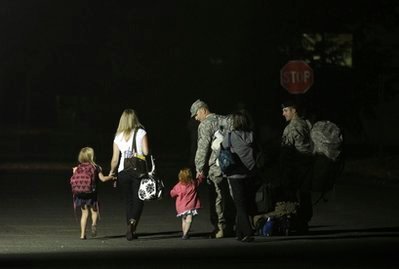
The Evershed family. Pictured: Alyssa(6), Courtney, Ashton(2), and 1SG Jason Evershed walking back to their car after a 12 month deployment. (courtesy LIFT)
KRIS: Two things: 1: This effort immersed me so deeply into the military community that I've had the opportunity to see first-hand just how strong and supportive a "family" it often is and how happy I am to be a part of it. (I used to shun it when I was younger and Contrary Without a Cause.)
2. Seeing how enthusiastic people are about it. I am supremely grateful to everyone who's helped spread the word about LIFT, and I'm even more grateful to everyone who spreads word about next week's letter-writing campaign.
"What's that?" you ask.
As briefly as possible: March 4th, mail your letter to TIME Magazine and let them know you want them to consider the military family as its 2011 Person of the Year. You don't even have to write it – I'm writing it and posting it at the LIFT site on Monday, Feb. 28, so you can print, sign, and mail it. You can also copy and paste it onto your own blogs so your readers can print, sign, and mail it directly from there. (Read the initial announcement.)
The goal is to overwhelm TIME Magazine with letters from across the country. The letters will introduce the editors to the idea, and with luck, they'll get so many of them it will attract media attention.
Media attention is key to the effort. If the military family community and its supporters make enough of an impact to be addressed by the media, people will have to take an interest.
This is just a sample of people who have been incredibly helpful so far, and to whom I'm very grateful.
KEL: What has been the most frustrating?
KRIS: That Oprah isn't telling everyone to mail in their letters on March 4. Michelle Obama was recently a guest on Oprah's show to try to raise awareness for military families, and I knew Oprah would love the letter idea because that's precisely the motivation behind it, so I immediately sent her a press release. It's possible she hasn't seen it, yet.
It can be frustrating, too (or difficult) trying to figure out how to entice people to keep telling friends and family about "'Like' it for TIME," because it's an ongoing effort – TIME doesn't start looking at contenders until September.

(courtesy LIFT)
KEL: Other than "liking" the Facebook page, what can people do to help Time Magazine make the Military Family Person Of The Year?
KRIS: Mail their letter on March 4th (March forth!).
Also, tell friends! Lead them to the website (http://likeitfortime.wordpress.com), email links to interviews and the photos page, leave comments about it if it springs to mind while reading articles online (including the link to the website, of course), send messages to local and national media telling them this effort deserves their attention, and – yes, I'm saying it again – take part in the March 4 letter-writing campaign which, if it works, will (I'm not kidding) be remembered for a long time.
KEL: What do you say to people who argue that this effort condones war and that Person of the Year should go to war protesters or advocates for peace?
KRIS: I think most people are advocates for peace. This effort isn't about war, and it isn't about peace. That is to say it's not a political effort. If it's trying to promote anything, it's a wider and deeper understanding of the military family experience.Whether you like war or don't, we're in it. People we love are dying in it. People back home are trying to figure out how to deal with maintaining normalcy for their children with a parent missing for a year, back for a year, gone again for a year… They're figuring out how to maintain a "normal" marriage via email, sporadic phone calls, and – frankly – fear of death. They're trying to get back to a "normal" marriage after a year-long separation. They're trying to figure out how to help someone with PTSD or a missing leg, how to stop obsessing over their loved one once they come home (emotions that plague you on a constant basis for months at a time can't be shut off that easily), how to stop feeling anxious, how to not think about the next deployment…
That makes it sound like military families are a wreck. They're not – but they do have a unique and powerful set of complex challenges.

(courtesy LIFT)
People – the 99% of the people who have no direct experience with the military – think they know all the war stories they need to know because they've seen movies and read books, but what they've read only tells them one side: the soldier's side. There's a whole other aspect (and it's just one of many) of war many people don't often consider, and what they're told about it via the news and TV shows is often pretty one-dimensional. This is an effort to get them to look more closely. Read what military spouses have had to say about their experiences here.
KEL: What did you like about Ian's deployment?
KRIS: Anything I liked about it, I liked in retrospect. I love his letters – he's the best letter-writer I've ever known, and his handwriting on an envelope gave me a thrill I can't really explain, but at the same time, it was like torture to "see" part of him, but not be able to be with him. It was a reminder that he was so far away. I also liked the idea of seeing him again. Obvious, yes – but not. The idea of seeing him when he came home was a fantasy. It was "Everything will be doves and bluebirds when we see each other." But in real life, it was as awkward for me as it was exciting. His hand felt more foreign to me than it had felt in my imagination – as would any touch when you haven't been touched for months. In my imagination, it felt welcome, warm, and "home." In real life, it felt like holding hands for the first time. I might have blushed. I was shy to kiss him, to look him in the eye. And it was all absolutely beautiful – but it was different than I'd thought it would be. Nothing about the entire experience was simple, and in retrospect, I like having felt all the things I felt. I've never had so many emotions – all of them at a peak – at once. Talk about passionate. The whole deployment experience is filled with feelings that are layered, layered, layered…
It might be because I'm a writer that – in RETROSPECT – I appreciate that kind of drama. It's also important to note that I'm able to appreciate it (in retrospect) because nothing bad happened to Ian. He wasn't injured, either physically or mentally, so my perspective on our deployment experience is far different from those of others who have had to deal with injuries – mental or physical – or fatalities.
A regular feature of LIFT is the Yellow ribbon questions, or interview with military family members (and I encourage you in the strongest possible way to go read them). I thought I'd turn the tables a little and ask Kristen a couple of those same questions…
KEL: People will often say, if you're married to someone in the service and they deploy, "You know what you were getting into." What's your response to that?
KRIS: You can't really fathom what "deployment" means until you experience it. A year away? Well, what's one year out of our whole lives? Worry? Oh, pish tosh. Worry schmorry. I'm a big girl. Possible death? Yeah, but any of us could get hit by a bus tomorrow. It'll be fine.
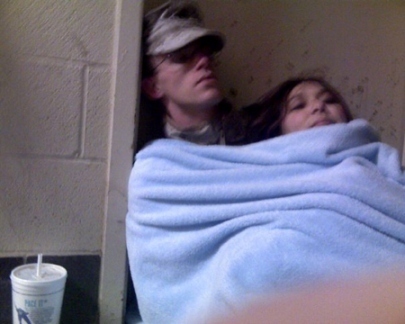
February 2010, Camp Lejeune, NC. "This was the last time I got to lay in my husband's arms before he deployed. I didn't care that he wasn't awake. The only thing I cared about was him holding me in his arms, hearing his breath and heart beating beneath me. I will treasure the memories of that night till he steps off that bus and back into my arms." - Amanda Williams (courtesy LIFT)
It's a little like this: You say goodbye to the person you love, and you don't see them for a very long time. They're alive and you can communicate, but you can't get at them. You can't hold their hand or give them just one more hug. Two weeks go by. Two months, and you're hearing bad things on the news about people not far from the person you love. Four months, now, since the last time you saw them, and you're really wishing you could touch them for just one second because they could die tomorrow. All this time they've been alive on this planet with you, just hours away by plane, but you couldn't get to them. You're suddenly tempted to book a flight to Afghanistan or Iraq and do whatever you have to do to find them, because why not? Wouldn't it be worth it? How can you not try to see the person you love under such circumstances? How can you just sit home and do nothing but wait?
At the very least, if the person you love is hit by a bus tomorrow on their way to work, the last time you saw them was probably today.
KEL: Many have said deployments get easier every time. Do you think it will be easier for you when he deploys again?
KRIS: That would be great. I think I'll be a little less worried (because I couldn't possibly be more worried than I was when he was in Iraq in '03), but I'll miss his physical presence more. In '03, we hadn't yet lived together, so rather than missing what was, I was deathly afraid of us never getting the opportunity to have what could be. (We'd decided to be together just weeks before he found out he'd be leaving for Iraq, and that was after a decade of loving each other from different parts of the country as we trucked along in our very different, very separate lives). When he leaves in '12, I'll miss what is, and I'll be afraid of losing who I've come to know so much better, and love so much more, than I did then.
——————————————————————————–
While doing research for this interview, I discovered the Like It For Time Zazzle store with t-shirts, mugs, key chains and other great items available. All of the proceeds go toward a LIFT promotion blast on September 11, 2011, with remaining monies to benefit Treasure Our Troops. Check it out!
LIFT links:
Facebook page
Website
LIFT Zazzle store








February 25, 2011
The Vagina Monologues in Belfast Maine
Next weekend, I will be appearing in The Vagina Monologues with a group of freaking amazing actresses. It's a heartwarming, heartbreaking, hilarious play and the proceeds help out two great causes. I am VERY excited about this and I truly hope to see lots of my Maine buddies there.
Here's the basic info:
 WHERE: Waterfall Arts (Fallout Shelter) 256 High St, Belfast Maine
WHERE: Waterfall Arts (Fallout Shelter) 256 High St, Belfast Maine
WHEN: Friday and Saturday, March 4 and 5 at 7:15 PM
Price: $10
Tickets for sale at Yo Mamma's Home and The Green Store in Belfast.
A light dinner will be available before the show for $7.
Proceeds to benefit vday.org and New Hope For Women, an organization which offers support to people in Lincoln, Knox and Waldo counties (Maine) affected by domestic and dating violence and provides educational resources to assist communities in creating a safer and healthier future.
The Vagina Monologues is an episodic play written by Eve Ensler, which ran at the off-Broadway Westside Theatre after a limited run at HERE Arts Center in 1996. Ensler originally starred in the production; when she left the play it was recast with three celebrity monologists. The production has been staged internationally, and a television version featuring Ensler was produced by the cable TV channel HBO. In 1998, Ensler and others, including Willa Shalit, a producer of the Westside Theatre production, launched V-Day, a global non-profit that has raised over $75 million for women's anti-violence groups through benefits of The Vagina Monologues.








February 15, 2011
Guest post – Elisa Lorello & Sarah Girrell
A Chronology of Valentines

Elisa Lorello
The insanity begins around eight years old, when your mom sends you to school armed with 25 identical cards the size of bookmarks, one for each classmate – even the ones you despise – that says, "You are Special!" You count the cards you receive, desperate to be sure that you weren't skipped by anyone (and more often that not, you were).
By adolescence, courtesy is out the window and you're not getting the pity Valentines from politically correct moms. No, you've been upgraded to flowers distributed by homeroom teachers, and woe to the one who gets none. (Or perhaps you had the misfortune to be out sick when Valentine's Day was on a Friday, and returned on Monday to three wilted carnations from your only three friends, none of them boys.)
By eighteen, Valentine's Day is about the devotion. You not only clean out Hallmark's card stock, but cuddly toys are now involved. You text your valentine incessantly, trying to figure out how many ways one can say, "I would *so* turn into a vampire for you."
It only gets worse. At twenty-five, Valentine's Day is synonymous with credit card debt. Because if you're not maxing out your Visa on a trip to Puerto Rico with your beloved, you're with your three best girlfriends in attempt to prove that you don't need a man. And if, God forbid, you're single on Valentine's Day, you're in that dark place of LIFE SUCKS AND THEN YOU DIE. ALONE. Russell Stover does nothing to dissuade you of this notion.
By your thirties, despite copious amounts of chick lit telling you to do otherwise, you've lightened up a bit. You now celebrate Valentine's Day the day after, when you've scored on 50% off chocolates, regardless of whether you're in a relationship.
By forty, the most romantic thing your Valentine can do for you is buy dishwashing liquid—or motor oil—because he/she noticed you were out of it. And, after considerable Googling, you've discovered that St. Valentine had a rather sordid past.

Sarah Girrell
As the years go on, Valentine's Day turns into a state of being rather than the emphasis on being with – or without – someone else. Reservations are no longer made, but perhaps the table is set with just a little extra care. Roses no longer need to be ordered weeks ahead because favorite flowers are bought on a whim in April or October. Most importantly, you've learned the Golden Rule that applies to every day, the lesson that The Beatles (or was it Dylan Thomas?) said best:
And in the end,
the love you take
is equal to the love you make.
_____________________________________
Why I Love Singlehood

Why I Love Singlehood
Eva Perino is single and proud of it. Owner of The Grounds, a coffee shop nestled in the heart of a college town, thirtysomething Eva cherishes her comfortable life filled with quirky friends, a fun job, and no significant other. In fact, she's so content to be on her own that she started a blog about it: "Why I Love Singlehood." Yet when she hears the news of her ex-boyfriend's engagement, her confidence in her single status takes a surprisingly hard hit.
So begins Eva's clumsy (and occasionally uproarious) search for love as she secretly joins an online dating site, tries her hand at speed-dating, and breaks her own rule by getting involved with one of The Grounds' regulars. Soon Eva is forced to figure out exactly who—or what—is the true love of her life. Sparkling with warmth and wit, Why I Love Singlehood is a charming and insightful must-read for anyone—single or otherwise—who has ever been stymied by love.












